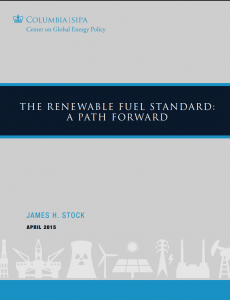Full Title: The Renewable Fuel Standard: A Path Forward
Author(s): James Stock
Publisher(s): Columbia SIPA Center on Global Energy Policy
Publication Date: April 1, 2015
Full Text: Download Resource
Description (excerpt):
America’s renewable fuels policy is at a crossroads. The Renewable Fuel Standard (RFS) is derided by some as an inefficient program that is driving up costs for fuel suppliers and a threat to motorists at the pumps, while others insist it is a valuable tool to reduce US dependence on foreign oil that will also pay future dividends in the fight against climate change. Developed initially in 2005 and expanded in the Energy Independence and Security Act (EISA) of 2007, the RFS seeks to reduce both greenhouse gas emissions and US dependence on oil imports by establishing increasing quantities of renewable fuels that must be blended into transportation fuels. In part because of the RFS, the volume of renewable fuels in the US surface transportation fuel supply more than doubled from 2007 to 2013. But even though the twin climate and energy security goals of the RFS remain as valid as when the EISA was enacted, today the RFS is facing multiple challenges. The current first-generation biofuels mainly use food crops as feedstock and are either expensive or have modest GHG improvements over petroleum fuels. The development and commercialization of low greenhouse gas second-generation biofuels—critical to the ultimate success of the program—has fallen far short of the very ambitious goals laid out in the EISA. Moreover, many cars are limited to gasoline with at most 10% ethanol (the dominant biofuel)—the so-called E10 blend wall—and in 2013 the amount of ethanol in the US fuel supply reached the E10 plateau. As a result, the RFS, and US biofuels policy more generally, has reached a critical point at which some energy industry leaders and policy makers have called for it to be reformed or even overturned. Yet the challenge of transitioning to a low carbon transportation sector remains, and if anything is made both more difficult and more pressing because of low gasoline prices and the likely associated increase in consumption. Because the first-best option of a carbon tax combined with substantial early-stage research and development funding remains politically unlikely, it is important to keep options open by supporting research and investment in a wide range of low-carbon technologies. This paper examines the economics of the RFS in order to understand the challenges it has faced since 2013 and takes a critical look at the choices currently facing the RFS and US biofuels policy. In brief, the RFS serves as a tax on petroleum fuels and a corrective subsidy to renewable fuels. As a matter of economics, such a system is justified when one of the fuels generates more costs not borne by its users (i.e. externalities) than does the other fuel. That is the case here: renewable fuels both reduce dependence on foreign oil and generate less greenhouse gas emissions than do petroleum fuels. Under the RFS, the subsidy to renewable fuels operates through the market for RFS compliance permits, which are called Renewable Identification Numbers (RINs). The fundamental driver of RIN prices is the difference in the price at which a renewable fuel can be produced and the price at which it can be sold, at a given mandated volume of the renewable fuel. Because RINs can be banked, the RIN price depends not only on this fundamental subsidy value in the current year, but on expectations of future fundamental subsidy values. These current and future subsidy values in turn depend on economic factors, such as the price of oil and the cost of producing biofuels, as well as on current and future RFS policy about the volume (or fraction) of renewable fuels in the fuel supply.
